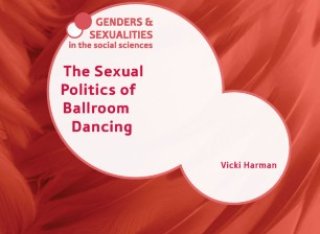
Dr Vicki Harman
About
Biography
My research interests are primarily in the areas of family life, gender, food practices and social inequalities. I am passionate about using qualitative research methods including ethnography, interviews, focus groups and creative and visual approaches to research. I am a co-director of the Centre for Research on Ageing and Generations.
I am a Co-Editor of Sociology, the journal of the British Sociological Association. I am a Senior Fellow of the Higher Education Academy.
Areas of specialism
University roles and responsibilities
- Co-Director of the Centre for Research on Ageing and Generations
My qualifications
Affiliations and memberships
News
In the media
ResearchResearch interests
My research interests centre around family life, gender, food practices, social inequalities and social identities (particularly gender, social class and ethnicity). Recent projects have focused on:
- parents’ perspectives on preparing lunchboxes for their children
- mothers’ perspectives on feeding the family on low and reduced incomes
- changing notions of 'good digital parenting' prior to and during the COVID-19 pandemic
- domestic violence, liminality and possessions
- the experiences of interracial families
- the changing nature of grandparenting
- ballroom dancing and gender
- food practices in women’s prisons.
More information on selected projects can be found below:
Research projects
This project analyses the experience of food in women’s prisons using an intersectional approach. It adopts an innovative suite of mixed qualitative methods in four prisons in order to gain insight into women’s experiences of this aspect of prison life. The study will open up wider conversations about food in prisons through an exhibition of prisoners’ art run in partnership with Koestler Arts.
Using observations and interviews, this study explores the way in which food contributes to the experiences of prisoners and their families in the prison visiting room of a women's prison.
Intensive Grandparenting? Exploring the Changing Nature of Grandparenting in the UK (funded by the British Academy)Although many grandparents provide regular care for their grandchildren,
relatively little academic attention has been paid to the nature of contemporary
grandparenting. This project seeks to understand whether the changing nature of
parenting (particularly the intensification of parenting and the notion of children at
risk) has influenced grandparents’ narratives and practices. It does so by
investigating the practices of 20 grandparents in the UK who look after their
grandchildren at least weekly. Employing photo-elicitation interviews and 1-1
interviews, this study will investigate whether the intensification of parenting has
influenced the grandparenting role and if so, the extent to which it has changed
grandparent-grandchild relations. The study will contribute an increased
understanding of the role and practices of contemporary grandparents in family
life. It will engage with and extend interdisciplinary academic debates on
childhood, grandparenting, intensive parenting, doing and displaying families, and
surveillance in family life.
Indicators of esteem
Consumer Culture Theory Conference ‘Best Competitive Paper Award’ to Cappellini, B. Harman, V. Parsons, E. Marilli, A. for ‘Intensive Mothering in Hard Times: Foucauldian Ethical Self-Formation and Cruel Optimism, Odense, Denmark, July 2018.
International Sociological Association RC13 Young Leisure Scholar Award to Harman, V. for ‘Leading the Way? Male Ballroom and Latin American Dancers’, Vienna, Austria, July 2016.
Research interests
My research interests centre around family life, gender, food practices, social inequalities and social identities (particularly gender, social class and ethnicity). Recent projects have focused on:
- parents’ perspectives on preparing lunchboxes for their children
- mothers’ perspectives on feeding the family on low and reduced incomes
- changing notions of 'good digital parenting' prior to and during the COVID-19 pandemic
- domestic violence, liminality and possessions
- the experiences of interracial families
- the changing nature of grandparenting
- ballroom dancing and gender
- food practices in women’s prisons.
More information on selected projects can be found below:
Research projects
This project analyses the experience of food in women’s prisons using an intersectional approach. It adopts an innovative suite of mixed qualitative methods in four prisons in order to gain insight into women’s experiences of this aspect of prison life. The study will open up wider conversations about food in prisons through an exhibition of prisoners’ art run in partnership with Koestler Arts.
Using observations and interviews, this study explores the way in which food contributes to the experiences of prisoners and their families in the prison visiting room of a women's prison.
Although many grandparents provide regular care for their grandchildren,
relatively little academic attention has been paid to the nature of contemporary
grandparenting. This project seeks to understand whether the changing nature of
parenting (particularly the intensification of parenting and the notion of children at
risk) has influenced grandparents’ narratives and practices. It does so by
investigating the practices of 20 grandparents in the UK who look after their
grandchildren at least weekly. Employing photo-elicitation interviews and 1-1
interviews, this study will investigate whether the intensification of parenting has
influenced the grandparenting role and if so, the extent to which it has changed
grandparent-grandchild relations. The study will contribute an increased
understanding of the role and practices of contemporary grandparents in family
life. It will engage with and extend interdisciplinary academic debates on
childhood, grandparenting, intensive parenting, doing and displaying families, and
surveillance in family life.
Indicators of esteem
Consumer Culture Theory Conference ‘Best Competitive Paper Award’ to Cappellini, B. Harman, V. Parsons, E. Marilli, A. for ‘Intensive Mothering in Hard Times: Foucauldian Ethical Self-Formation and Cruel Optimism, Odense, Denmark, July 2018.
International Sociological Association RC13 Young Leisure Scholar Award to Harman, V. for ‘Leading the Way? Male Ballroom and Latin American Dancers’, Vienna, Austria, July 2016.
Supervision
Postgraduate research supervision
I would be keen to receive proposals for doctoral work in any of the following areas: family life; mothering; grandparenting; food practices.
I have previously supervised five PhD students to the successful completion of their research projects.
I am currently supervising three PhD students.
Find out more about the Sociology PhD Programme
Teaching
I have extensive experience of teaching sociology including modules on families and society, qualitative research methods, contemporary sociology, and social inequalities and social identities.
Publications
Highlights
Harman, V. (2019) The Sexual Politics of Ballroom Dancing, Palgrave: London.
This book presents an engaging sociological investigation into how gender is negotiated and performed in ballroom and Latin dancing that draws on extensive ethnographic research, as well as the author’s own experience as a dancer. It explores the key factors underpinning the popularity of this leisure activity and highlights what this reveals more broadly about the nature of gender roles at the current time. The author begins with an overview of its rich social history and shifting class status, establishing the context within which contemporary masculinities and femininities in this community are explored. Real and imagined gendered traditions are examined across a range of dancer experiences that follows the trajectory of a typical learner: from finding a partner, attending lessons and forming networks, through to taking part in competitions. The analysis of these narratives creates a nuanced picture of a dance culture that is empowering, yet also highly consumerist and image-conscious; a highly ritualised set of practices that both reinstate and transgress gender roles. This innovative contribution to the feminist leisure literature will appeal to students and scholars of anthropology, dance, sport, gender, cultural and media studies.
This book presents an engaging sociological investigation into how gender is negotiated and performed in ballroom and Latin dancing that draws on extensive ethnographic research, as well as the author's own experience as a dancer. It explores the key factors underpinning the popularity of this leisure activity and highlights what this reveals more broadly about the nature of gender roles at the current time. The author begins with an overview of its rich social history and shifting class status, establishing the context within which contemporary masculinities and femininities in this community are explored. Real and imagined gendered traditions are examined across a range of dancer experiences that follows the trajectory of a typical learner: from finding a partner, attending lessons and forming networks, through to taking part in competitions. The analysis of these narratives creates a nuanced picture of a dance culture that is empowering, yet also highly consumerist and image-conscious; a highly ritualised set of practices that both reinstate and transgress gender roles. This innovative contribution to the feminist leisure literature will appeal to students and scholars of anthropology, dance, sport, gender, cultural and media studies.
This cross-disciplinary volume brings together diverse perspectives on children’s food occasions inside and outside of the home across different geographical locations. By unpacking mundane food occasions - from school dinners to domestic meals and from breakfast to snacks - Feeding Children Inside and Outside the Home shows the role of food in the everyday lives of children and adults around them. Investigating food occasions at home, schools and in nurseries during weekdays and holidays, it reveals how children, mothers, fathers, teachers and other adults involved in feeding children, understand, make sense of and navigate ideological discourses of parenting, health imperatives and policy interventions.
Revealing the material and symbolic complexity of feeding children, and the role that parenting and healthy discourses play in shaping, perpetuating and transforming both feeding and eating, this volume shows how micro and macro aspects are at play in mundane and everyday practices of family life and education. This volume will be of great interested to a wide range of students and researchers interested in the sociology of family life, education, food studies and everyday consumption.
Purpose: This article examines how Mulino Bianco, an iconic Italian bakery brand has reshaped the symbolic and material aspects of breakfast in Italy, transforming a declining practice into a common family occasion.
Methodology: A socio-historical analysis of the iconisation process has been undertaken with a framework investigating the symbolic, material and practice-based aspects of the brand and their changes over time. Archival marketing material, advertising campaigns and interviews with brand managers constitute the main data for analysis.
Findings: Three crucial moments have been identified in which the brand articulates its relationship with the practice of breakfast. During the launch of the brand, the articulation was mainly instigated via the myths of tamed nature and rural past, and the material aspect of the products reinforced such an articulation. In the second moment, the articulation was established with the brand’s materiality, emphasised through the use of promotional items targeting mothers and children. In the last phase, a cementification of the articulation was achieved mainly via the symbolic aspect of the brand – communicating Mulino Bianco as emblematic of a new family life in which the ‘Italian breakfast’ was central.
Originality: Theoretically this paper advances our understanding of the pervasive influence of brands in family life, showing how they do not simply reshape existing family food practices, rather they can re-create new ones, investing them with symbolic meanings, anchoring them with novel materiality and equipping consumers with new understandings and competences.
Key words: breakfast, family food practices, Mulino Bianco, iconisation process, Italy.
This study investigates how mothers respond to school surveillance of their children's packed lunches. In a context where increasing attention is focused on healthy eating, we adopt a biopedagogical approach to illustrate different positions and strategies which mothers occupy in relation to feeding their children in the school setting. We use photo‐elicitation interviews and focus groups to trace both the discursive and practical significance of these biopedagogies. We find that the subjective experiences of feeding children at school are infused with classed notions of mothering in public. Our analysis highlights two broad positions. Firstly, there were those with strong distinctions between home‐food and school‐food, which was associated more clearly with middle class families. Secondly, there were those with more fluid boundaries between home‐food and school‐food. This was more commonly encapsulated by working class mothers who were seen to place more emphasis on their children as autonomous decision‐makers. Overall the findings document localised and classed practices of resisting the school's normalising gaze.
This article unpacks the experiences of 30 British women making lunchboxes for their children, and their opposition to opting for school dinners. Findings emerging from photo-elicitation interviews and focus group discussions show how mothers consider themselves the only social actor able to make a ‘proper lunchbox’. School dinners are considered a risky option for their children, and fathers’ interference in preparing lunchboxes is viewed with suspicion. The article shows how lunchboxes can be viewed as an expansion of intensive mothering: a way of making home away from home, stretching the intensive domestic care used for toddlers to school-aged children. Expansive mothering is characterised by mothers’ mediating role that places them between the child and the outside world. This role is mainly performed as a risk management activity aimed at recreating the domestic security outside the home, yet it also reinforces the message that feeding children is a mother’s domain.
This article explores the way in which Vietnamese mothers purchase, gift and share toys with their children. The study utilises a qualitative design comprising semi-structured interviews with 10 Vietnamese middle-class professional working mothers of children aged between 5 and 9. This research highlights the way in which toys defined as “good” by mothers need to fulfil a number of important practical and social functions: they act as an investment in the child's future, as a reward, and as a means for mothers to buy time for themselves. The findings illustrate how these functions are influenced by Confucian and Western discourses of intensive mothering, generating a localized style of middle-class intensive mothering, characterized by what we have called the ideal of the triple excellent and intensive mother.
Strictly Come Dancing and Dancing on Ice are primetime reality television shows that promote partner dancing as a form of leisure in the UK. Both shows have consistently represented partner dancing as a partnership between a man and a woman. However, in 2019 and 2020male/male partnerships were introduced into both shows for the first time. Drawing on media reports that discuss these male/male partnerships, this paper explores how the partnerships were represented and made sense of by mainstream and LGBT + media. Employing thematic discourse analysis, we demonstrate how the male/male dance partnerships were framed by a complex and contradictory inclusive masculinity discourse. On the one hand, this discourse celebrated the male/male couples as evidence that Britain is a progressive society in which homophobia is in decline. At the same time, the representations largely centred on the male dance couples’ bromances while ignoring or silencing discourses of gay love or sex. We show that although the representations can be viewed as a positive step forward, there were also some limitations to the representations which necessitate more critical examination in future research.
This article investigates how culinary taste contributes to the formation of middle class identity in a working class context in the UK. We explore practices of food consumption among a group of individuals working at a UK university located in a working class city. We find a rather limited and discrepant cosmopolitanism, in which culinary practices are evaluated in terms of those worth engaging in, and those not worth engaging in, based on their ‘user friendliness’ for cosmopolitan middle class dispositions. Depictions of the local food culture as lacking are also dominant, used as a negative ground against which these dispositions are hierarchically formulated. Here middle class culinary tastes seem to be driven by disengagement with the wrong sort of place and a relatively closed alignment with the ‘proper’ and the ‘safe’ rather than by any open creative individuality.
This article explores middle class mothers’ narratives on their daily routines of preparing lunchboxes for their children. In this study lunchboxes are understood as an artefact linking together discourses and practices of doing and displaying mothering, media and government discourses of feeding children and broader issues of care and surveillance in private and public settings. Drawing on semi-structured, photo elicitation interviews and a focus group discussion, this article illuminates how mothers feel on display through the contents of their children’s lunchboxes.
Purpose – The purpose of this paper is to explore the relationship between lunchboxes, fun food and leisure. Looking beyond concerns focusing solely on health and nutrition, this article unpacks how mothers seek to provide lunchtime food that is also a source of leisure and pleasure.
Design/methodology/approach – Photo-elicitation interviews and a focus group were conducted with 11 mothers who regularly prepare lunchboxes for their children aged between 9 and 11 years.
Findings – Mothers intend the food they provide to act as a leisure experience and a break from the pressures of school. Mothers understand that lunchboxes must fit with children’s other activities taking place in their lunch-hour. Lunchboxes should support children’s future leisure opportunities by providing nutrition and variety to support their growth and development. The discussion of lunchboxes also shows that fun food is not simply understood in opposition to healthy food. Mothers have a wider understanding of the transgressive nature of fun through food, which goes beyond the market offer and understanding of fun.
Research limitations/implications – As the study is based on a small sample of relatively affluent families in the UK, caution is needed in generalising the findings to wider groups. However, the study offers qualitative insights and highlights the connections between leisure, fun food and lunchboxes that can be explored in further research.
Originality/value – This is the first paper to explore the interconnections between lunchboxes, fun food and leisure. It provides valuable insight into mothers’ views about food prepared at home for consumption at school.
In order to analyse the way in which food provision is shaped by social identities including gender, social class, ethnicity and migration, this chapter examines the narratives of migrant parents interviewed as part of a broader study of parents preparing lunchboxes for their children. We focus on three cases; Jasmeen, originally from India, who gets up at 5am to prepare home-made chapatis for her daughter’s lunchbox, Danijela a mother from Croatia who hates lunchboxes and sees them as ‘very English’ but continues to prepare them, and Luiz, a middle-class father originally from Latin America whose involvement in preparing nutritious lunchboxes is symbolically crucial to his claim as a ‘good father’ within his household. By exploring these accounts, we can see how the biographies of family members intersect with cultural and structural influences such as gender, social class, ethnicity and migration, to influence the food going into children’s lunchboxes.
This pioneering volume draws together theoretical and empirical contributions analyzing the experiences of white mothers in interracial families in Britain, Canada and the USA. The growth of the mixed race population reflects an increasingly racially and culturally heterogeneous society, shaped by powerful forces of globalisation and migration. Mixed family formations are becoming increasingly common through marriage, relationships and adoption, and there is also increasing social recognition of interracial families through the inclusion of mixed categories in Census data and other official statistics. The changing demographic make-up of Britain and other Western countries raises important questions about identity, belonging and the changing nature of family life. It also connects with theoretical and empirical discussions about the significance of ‘race’ in contemporary society.
In exploring mothering across racialised boundaries, this volume offers new insights and perspectives. The notion of racialisation is invoked to argue that, while the notion of race does not exist in any meaningful sense, it continues to operate as a social process. This crucial resource will appeal to academics, researchers, policy makers, practitioners and undergraduate and postgraduate students.
This paper explores the ways in which the intensification of parenting and the notion of children at risk have influenced grandmothers’ narratives and practices. Interviews with grandmothers who regularly look after their grandchildren, reveal that their practices are framed around the notions of children to be protected, educated and entertained. Such notions reveal that aspects of grandmothers’ roles as protectors, educators, playmates and confidants involved negotiations with parents around the ideal of ‘putting the child first’. The paper argues that intensive parenting has influenced grandmothering but the way this is enacted reveals resistance to certain aspects of intensive parenting.
Drawing on 34 semi-structured interviews, this study investigates the temporality of family practices taking place in the hot spot (Southerton, 2003). It does so by looking at how breakfast is inserted in the economy of family time in Italy. Our data show that breakfast, contrary to other meals, allows the adoption of more individualised and asynchronous practices, hinged on the consumption of convenience products. These time-saving strategies are normalised as part of doing family. Although the existing literature suggests that convenience and care are in opposition, and consumers of convenience products can experience anxiety and a lack of personal integrity, such features were not a dominant feature of our participants’ accounts. These findings suggest that the dichotomies of hot/cold spots and care/convenience are not always experienced in opposition when embedded within family practices. Hence, this study furthers understandings of family meals, temporality and the distinction between hot and cold spots.
In this article, we analyze the foodwork of mothers when feeding their families on low and reduced incomes. By exploring their accounts of food shopping and household budgeting, we argue that foodwork is intrinsically linked to other areas of social life and dominant values associated with “good mothering.” Through a careful consideration of the contexts and relations in which foodwork is valued, embedded, and made meaningful, we draw two key conclusions. First, we find that mothers' foodwork is oriented towards avoiding devaluation and maintaining a level of respectability as opposed to accumulating cultural capital. Second, we introduce the concept of foodcare arguing that it potentially offers low income mothers an alternative to the logic of capital for their demonstration of self‐worth.
This paper introduces an “ethics of care” lens to the literature on Transformative Services Research (TSR) to understand how service users and providers co-create transformational value and well-being. In considering six food poverty organizations—categorized as market-oriented, faith-oriented, or neighborhood-oriented—the authors argue that the intention behind enacting an ethics of care drives different possibilities for transformative value. The analysis is organized in line with Tronto’s (1993; 2001) phases of caring, and makes connections between values that drive the organization’s work, emerging subjectivities, practices that unfold as a result, and ultimately the value that is co-created. The findings show that caring relations must be considered “in situ,” as an organization’s values and practices are what determine the potential for transformative value.
This paper provides a reflection on the use of visual art workshops in an interdisciplinary feminist project with female survivors of domestic violence living in refuges in England and Portugal. The paper discusses the fieldwork in each location with attention to the interaction between participants, between participants and the researcher/s, and the cultural and institutional structures influencing the research and the images produced. Despite some key differences in the context, the analysis highlights key resonances and commonalities amongst the objects that survivors of domestic abuse depicted in each location. We use the feminist notion of ‘giving voice’ as an analytical tool throughout the paper. The paper argues that ‘giving voice’ was not unproblematically accomplished by using visual methods and suggests that our understanding remained partial and often reliant on verbal narratives accompanying the visual images produced. We also highlight issues of power emerging when exhibiting art generated through the study.
Discourses of intensive mothering now seem to dominate European and American parenting cultures. This is a problem for those mothers who don’t currently possess the resources to match up. In a study of Italian and British mothers that are experiencing low or reduced incomes we observe the ways in which they internalize intensive mothering discourses through a process of ethical self-formation (Foucault, 1985). This mode of self-formation involves detailed self-surveillance and self-discipline and abnegation of their own needs in place of other individual family members, and the family as a whole. We find a series of contradictory emotional effects which generate both pride and self-worth but also stress and anxiety. We advance the theory that mothers operate within an optimistic affective regime to make sense of these contradictory effects and retain a sense of agency and control over their lives and those of their families. However, drawing on Berlant’s (2011) concept of cruel optimism, we argue that such affective regimes may be very pernicious in their effects, only serving to hold mothers in a relation that is ultimately impassable and often unfulfilling.
This chapter focuses on a series of art workshops conducted in a women’s refuge in London, UK. The participant group were female survivors of domestic violence who were currently living in the refuge and who opted to take part in the workshops. The creative approach taken was a series of art workshops held in a group and orientated around the theme of objects. By using art materials, participants were asked to represent different categories of objects: namely loved, lost, missed and wanted objects. Theoretically, this project utilises the concept of liminality and the role of consumption and objects during times of transition. A feminist perspective provided the overarching framework, influencing the methods employed and the interpretation of the data. The chapter concludes with suggestions of how this method could be usefully applied to other contexts.
Ballroom Dancing is a leisure pursuit that is currently enjoying a resurgence stimulated by TV shows including ‘Strictly Come Dancing’ and ‘Dancing with the Stars’. Watching such TV shows can be a leisure activity in itself as well as encouraging viewers to attend dancing lessons. Existing scholarship has highlighted Ballroom Dancing’s focus on heterosexual partnerships and mixed-sex couples. In response to growing pressure from the LGBTQ+ community, in 2018, Strictly Come Dancing (SCD) announced they would feature same-sex professional partnerships for the first time. This chapter analyses online articles in order to discuss the response to the representation incorporated into the show. From our findings we argue that debates about inclusion and representation can act as a ‘positive problem’ (Stebbins, Positive sociology: An overview) for the leisure sphere.




